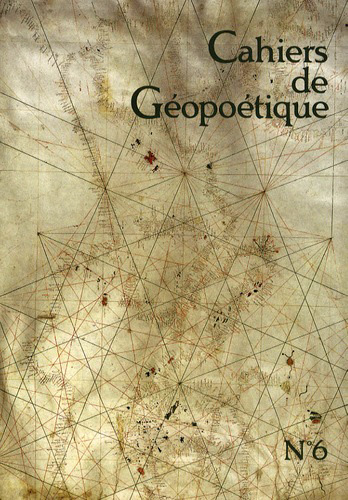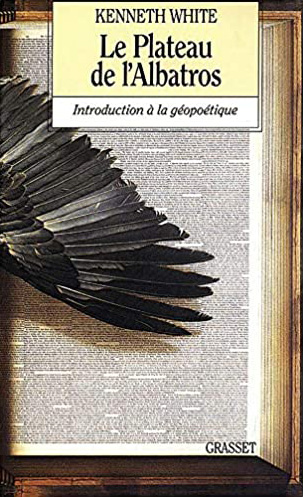
Geopoetics
presentation
The Great Field of Geopoetics
by Kenneth White
A theory? Yes. Let’s not be afraid of the word. The result of its rejection in recent times is an intellectual space filled choc-a-bloc with bits of this and that, odds and ends, one little « novelty » after another. Without theory, the mind goes round in circles, piles up commentaries and opinions, holes up in fantasia and the imaginary, gets lost in the spectacular, is drowned in insignificant detail. But for a theory to be valid, it has to be based on fundamental thought, has to be linked to ongoing practice and experience, has to remain open.
Over the centuries and millenia, culture (a practice permitting an enhancement of life and the expansion of intelligence) has been founded on myth, religion and metaphysics. Nowadays, what is called « culture » is founded on nothing. It simply proliferates, its only law being that of the market.
Everyone feels more or less vaguely that a basis is lacking. Any return to the old bases being naïve, partial or caricatural, it’s a new basis that geopoetics provides.
For a culture to exist in any deep sense of the word, there must be a consensus within the social group concerning what is essential. In every grounded and vivifying culture there is a central focus. Every member of the group (albeit at different levels of discourse) refers to it – the philosopher in his study, the peasant in his field. During the Christian Middle Ages, it was the Virgin Mary and the Christ. In the times of classical Greek culture, it was a philosophical and political agora. With the paleolithic tribe, it was the relationship between man and animal.
At one point in my itinerary, after long years of research in history and comparative culture, I asked myself if, beyond all the differences in religion, ideology, morality and psychology that spread today, often creating havoc, there might be something in which – North, South, East and West – we might agree. I came to the conclusion that it had to be the Earth itself, this strange and beautiful planet, apparently a rarity in galactic space, on which we all try, with pretty poor consequences most of the time, to live. Hence the « geo » in this neologism.
As to the word « poetics », I don’t use it in the academic sense of « theory of poetry ». Geopoetics lies outside the traditional sense of the word « poetry » (pure poetry, personal poetry, etc.), and has nothing to do with the current usage of the word, where it is reduced to sing-song lyricism, filmic fantasia, and so on. I suggest we waste no time on all this poverty-stricken sociology, and go straight to Aristotle’s noûs poietikos, « the poetic intelligence ».
What I mean by « poetics » is a fundamental dynamics of thought. That’s why, in my sense of things, there can be not only a poetics of literature, but a poetics of philosophy, a poetics of the sciences, and, why, not, at least potentially, a poetics of politics. The geopoetician is placed from the start within an enormity. I’m using « enormous », first, in the quantitative, encyclopedic sense (I’m by no means against the quantitative provided there may be enough energy around to get it moving), then, further, in the sense of « exceptional » (outside the norms). By moving an enormous amount of earth-matter, with an enlarged sense of things and of being, geopoetics opens up a new space of culture, thought and life. In other words, in fact in one singularly charged word : a world.
By the way, if I say « geopoetician » (like logician, mathematician), and not « geopoet » it’s to ward off reductions of the notion to some kind of lyrical expression of geography. Based on a trilogy of eros, logos and cosmos, geopoetics creates a general coherence – that is what I call « a world ».
A world, well conceived of, well understood, emerges from the contact between the human mind and the Earth. When the contact is sensitive, intelligent, subtle, you have « a world » in the fullest sense of that word. When the contact is stupid and brutal, you no longer have « a world », you have, in more and more degraded forms, that accumulation of confusion and nonentity, boredom and anxiety, etc., ordinarily called « the world ».
Everything began for me in a territory of twenty square kilometres on the west coast of Scotland, and in a direct relationship to the things of nature. A sociological objection to my pre-position and proposition will have it that not everyone has access to such a natural context. Of course. But it’s the recognition of the importance of such a context that can be the point of departure for a new radical conscience, a different educational grounding, another politics. And even in the most ill-favoured of urban contexts, signs and traces of the larger context can be picked up.
So as to renew and extend my initial experience, so as to amplify my knowledge and sense of things, I’ve crossed many different territories. And I continue to do so. Because the contact between idea and sensation, thought and emotion, must never be lost.
It was in 1979, travelling along the North back of the St-Lawrence river, making for Labrador, that the idea of geopoetics took form in my mind. I related this journey, trying to say the sensation and amplitude of the idea in the book The Blue Road.
Other books of travel and of residence have followed. Not only do they illustrate the original proposition in different ways, they make new proposals.
It’s in the book Le Plateau de l’Albatros* that I drew up the most complete map of geopoetics so far. I’d seen the concept emerging more and more distinctly in my own work, and I was more and more convinced of its necessity in our general context. I did the mapping from three points of view : scientific, philosophical and poetic.
To the scientific, philosophical and poetic approaches, I added existential and intellectual portraits of proto-geopoeticians such as Humboldt, Thoreau or Segalen, in the first place to insist on the fact that live thought is never separated from lived life, that theory has its source on the real, but also to show that the idea of geopoetics has been latent in individuals across time and space. An idea with no predecessors at all is unlikely to have much depth. What I do with the work of these predecessors is to read it in both an erosive and dynamising way. It’s no simple question of erudition and history. It’s a question of drawing up a geography of the mind.
It was in order to preserve the cutting edge of geopoetics as well as a clear vision of its perspectives that, in 1989, I decided to found the International Institute of Geopoetics.
A few years later, I proceeded to what I called an « archipelagisation », that is the creation of an archipelago (organisational network) of groups and workshops throughout the world whose principal aim would be to apply the idea of geopoetics to various local contexts.
The idea has advanced and spread, the groups work in different ways, the Institute holds the helm and maps the space ahead.
* An English version of this book is on the stocks. In the meantime, a convenient summary will be found in the booklet mentioned below : Geopoetics : Place, Culture, World.

A world is what emerges from the relationship between man and the earth. When this relationship is sensitive intelligent, complex, the world is world in the deep sense of the word : a clear space on which to live a full life. The ambition of the Cahiers de Géopoétique is, from a point of view that is not only that of Man, to draw up a magna mundi carta, a great map, a great chart of the world.
Kenneth White
see as well
les sommaires des cahiers
l’éditorial du n° 6

« …Far outside the mawkish fantasia of the New Age, situated outside all religiosity, based on a solid cultural bedrock with scientific, philosophical and literary references, the work of Kenneth White conceptualizes and gives language to what I see as a quest for a new synthesis, live, dynamic and complex, making high demands both on intelligence and sensitivity, between the advance of knowledge and the poetics of a world. To those looking for new forms of « development » (a word of which White remains wary) because they feel love, compassion and care for Nature (in technical terms, the « environment »), to understand it better, the creative research of Kenneth White will provide substantial nourishment. »
Olivier Frérot, Head of urbanism for the city of Lyons. « Le Plateau de l’Albatros de Kenneth White »